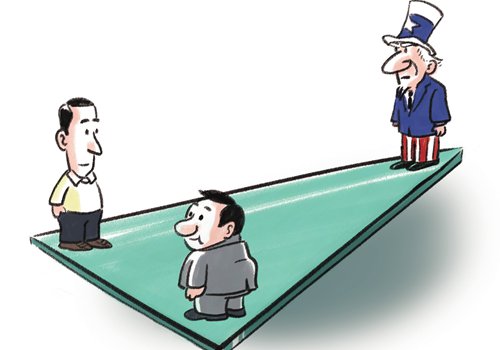
(Photo: Global Times)
About one and half years after US President Donald Trump was sworn in as the 45th US president, the international landscape has changed. Washington is charting a new path in world politics which does not include military interventions abroad. The bombardment of Syria in 2016 and 2017 was certainly important but not on a scale of similar American operations during the pre-Trump period. Washington is also critical of existing international agreements and condescending of multilateralism. The failure of the G7 to issue a joint statement during the Canada summit due to Trump's intransigence constitutes the most recent example.
Other major powers closely monitoring US foreign and economic policy after January 2016 find it difficult to interpret Trump's behavior. The US President remains unpredictable and tries to put his own personal - and perhaps provisional - stamp on developments being shaped for years. Under these circumstances, it is understandable for other major powers to come together in order to preserve the international status quo.
China and the EU, for instance, see new fields of cooperation in the Trump era. The decision of the US president to withdraw from the Paris climate accord and his opposition to the Iran nuclear deal are causing the same concern for Beijing and Brussels. Also, his allergy with free trade and introduction of metal import tariffs have generated anger. In several cases, Chinese and EU administrations are discussing how they can join forces to deal with the Trump effect in international politics.
It is a challenge for the two sides to explore whether they can keep existing international accords alive as well as to preserve free trade and the process of globalization irrespective of the American stance. The potential safeguarding of the Iran nuclear deal will be a test of this approach. While Beijing and Brussels are on the same page, the latter will have to choose between continuing its business with the Iranian government and retaliating against US sanctions with unknown consequences for the transatlantic partnership.
The improvement of Sino-European relations is good news in international relations. However, it is hard to imagine that China and the EU will build a deep strategic cooperation worthy of challenging the US in the long term. Even if they currently agree on several issues because of Trump's new isolationism and protectionism, the EU practically finds it complicated to act in world politics outside the American umbrella. It is heavily dependent on the US for its defense and therefore cannot easily ignore the fundamental stance of Washington.
Take EU's relations with Russia. Following pressure from the US, the EU imposed sanctions on Russia despite the resistance of some of its member states which needed closer economic ties with the country.
On these grounds, Brussels is not expected to disregard the American standpoint as far as China is concerned.
Even if some member states - principally Greece and Hungary - are continuously showing sympathy for some Chinese positions, for instance on human rights and the South China Sea, the general European approach is not China-friendly. It is not a coincidence that the EU has started to screen Chinese investments in the Old Continent, although it needs them and will do so in the future. Brussels and Washington, which disagree on several other fronts under Trump, have no real difference when finding ways on how to possibly rein in what they see as "a dangerous Chinese influence." While the Belt and Road initiative is being played out, this transatlantic understanding has been reinforced.
To sum up, China and the EU are currently collaborating to preserve what Trump is challenging. This cooperation provides new opportunities for a harmonious engagement of the two sides in dealing with rather "unnecessary" international problems. But to assume this cooperation might signal the beginning of a new process leading the EU away from the US on issues touching upon China's national interest, is rather closer to utopia than to reality. Therefore, while Sino-European relations are developing fast, restrictions should not be ignored.


